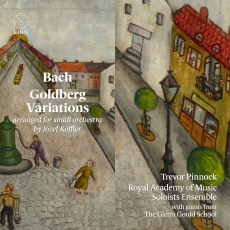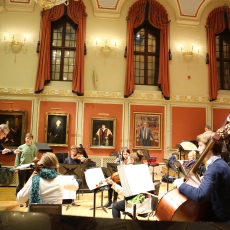Trevor Pinnock and RAM - Bach: Goldberg Variations - Gramophone
‘Do it on the radio’ was the title-character’s suggestion in Willy Russell’s Educating Rita when asked how to resolve the staging difficulties inherent in a production of Ibsen’s Peer Gynt. ‘Do it on an orchestra’ might have been her answer if required to assess the challenges of performing Bach’s Goldberg Variations. Spreading the work’s twining lines among a group of heterogeneous musicians obviates the most immediate problems of technique, passagework and cross-hand writing but also enables the imaginative arranger to explicate contrapuntal parts, fill in implied voices and add colour to a degree denied even the most exploratory pianist.
Józef Koffler’s arrangement for chamber orchestra attempts and largely succeeds in doing all of that. Koffler was born 1896 in Galicia, then part of the Austro-Hugarian Empire but a region that was to become one of the most contested in the political convulsions of the last century, and one especially hazardous for a Jewish composer. Despite success and renown during his lifetime, he and his family were first displaced, then arrested and ultimately exterminated by the Nazis in 1944. Koffler’s own music, misunderstood in its time, awaits reappraisal but this arrangement was discovered in 1993 and here receives a welcome commercial recording by young musicians under a veteran British Bachian.
Some of the variations when reimagined in this fashion take on the aura of forgotten Brandenburgs, with all the contrasts that entails, from the solo-string trio sonata of Var 9 to the almost comically pompous woodwind fugue of Var 10. Var 7 is given added depth by the addition of Stravinskyish sustained strings. Octave displacements and added middle voices (Vars 20 and 29, for instance) add further shadings. Koffler was a follower of the Schoenberg school and a friend of Berg’s, and accordingly some of his sharing out of voices takes on an air of Klangfarbenmelodie – the overlapping oboe, cor anglais, bassoon and violin of the ‘Black Pearl’ (Var 25), for example. There appears little opportunity (or perhaps will) to ornament on repeats, with such variety touched in through the subtle alteration of dynamics. Koffler’s voicings are nevertheless so persuasive that the attention is held throughout. The playing is as fine as is to be expected from the most promising of British and Canadian musical youth. A beguiling, kaleidoscopic and intensely personal take on this eternally rewarding sequence.


